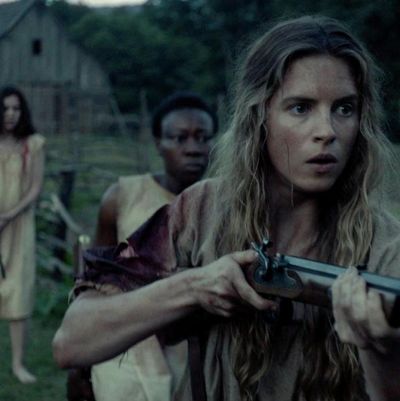
The Keeping Room is yet another powerful, post-apocalyptic survivalist drama about man’s inhumanity to man — in this case, woman. The difference is that it’s set in the past and is more or less historically accurate. The place is Georgia, the apocalypse the Civil War; more specifically, the war’s end and the march by William Tecumseh Sherman that drove Old Dixie down. The movie, directed by Daniel Barber from a script by Julia Hart, reminds you that works like The Road aren’t just projections into a barbaric future but extrapolations from the past. We have evidence that cruelty is second nature to some, first nature to others.
Brit Marling and Hailee Steinfeld play sisters Augusta and Louise, who remain on their farmstead with a slave, Mad (Muna Otaru), to fend for themselves against Union soldiers like the one who got his face blown off by Scarlett O’Hara on the stairs of Tara. The movie opens with a scene in which two Union scouts played by Sam Worthington and Kyle Soller rape and murder willy-nilly. You wait, sick with fear, for them to show up at the farm. You hope Augusta — clearly the stronger of the sisters — knows how to shoot.
The Keeping Room is slow and rather arty, with a chamber-music (plus harmonica and fiddle) score and cinematography that shrouds the faces in shadow. But it’s a fine piece of storytelling and earns its look and feel. The movie is steeped in the kind of melancholy that lifts it above sensationalism. It starts with a quote from Sherman that “war is cruelty” — no way around it — and it’s best to get that cruelty over with fast, without a pause for agonized reflection. There’s even something sad about Worthington’s murderous character, whose name is Moses. At one point he signals that he just can’t stop raping and killing — he has crossed over and can’t come back. War challenges the idea of free will.
Of course, this place was poisoned before the war. The slave, Mad, tells a story about a mysterious shed on the plantation where she grew up that the kids were excited to explore. Then Mad turned 10 and was thrilled to learn that she could go inside. That was the day her childhood ended. Otaru uses a little tweety voice — the voice of someone who has learned to be meek and is struggling to reclaim the piece of herself that was lost. The other performances are just as fine. At first I was disappointed to see Marling tamp down her dreamy eccentricities — but then I realized how wrong that would be for Augusta, who can’t afford to dream. Amy Nuttall (a Brit best known for Downton Abbey) gives a brief but startling vivid performance as a woman being used as a prostitute by the Union soldiers who finds the strength — it costs her — to help Augusta.
There’s a tragic turn — an accident — near the end of the film that I hated but that strikes me now as a way of ensuring the violence would never be seen as triumphant. That makes a change from Barber’s Harry Brown, in which Michael Caine plays a geriatric Cockney Charles Bronson who kills a lot of scummy thugs who needed killing. This time his script is by a woman, and the women in The Keeping Room are not so much more gentle as more farsighted. The key scene is when Augusta tells a gravely ill Louise the story of The Arabian Nights, except she can’t remember the name and in her retelling the stand-in for Shahrazad tells the king her stories over a 1,001 nights to save the life of her sister, not herself. The title has a double meaning. The Keeping Room is the 1,002nd night.


